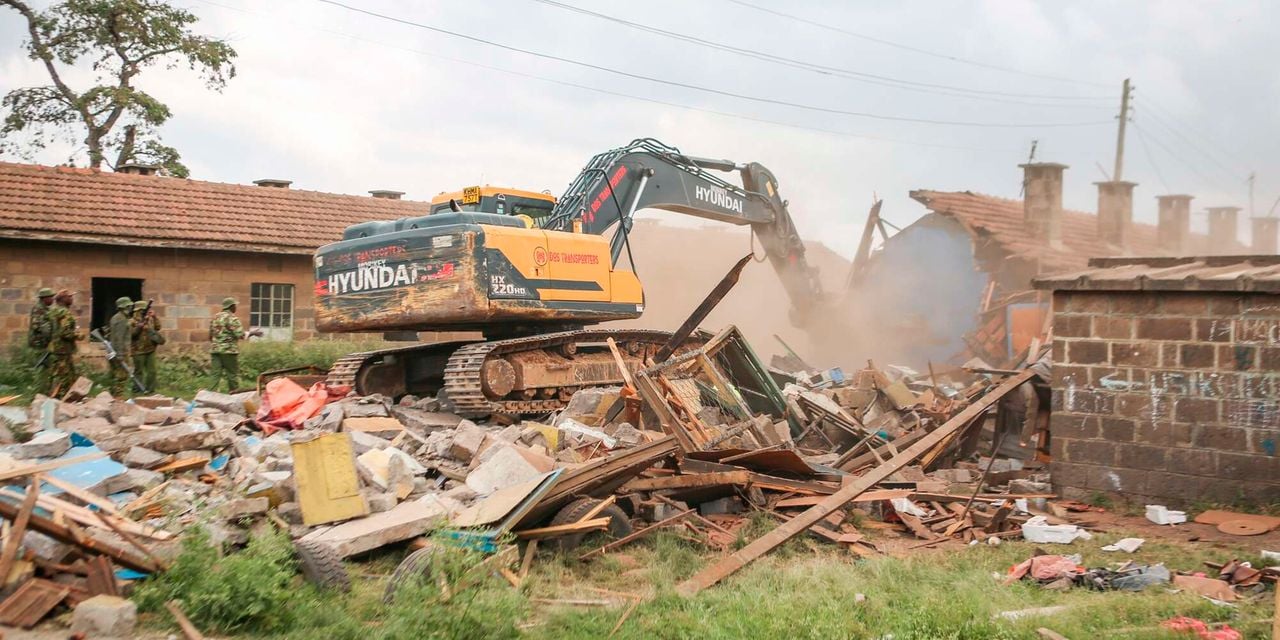
The High Court has stopped the ongoing evictions and demolition of homes in Nairobi’s Makongeni Estate
This is after residents filed a constitutional petition challenging their ongoing eviction to make way for the government’s affordable housing project, alleging multiple violations of their fundamental rights.
The petitioners—Brian Riang’a, Daniel Ndiau Okul, and Joshua Chuma—acting on behalf of the estate’s residents, accuse the Affordable Housing Board, the Ministry of Housing, and other State agencies of failing to adhere to constitutional safeguards in their relocation plans.
Central to the dispute is the ownership of the land where Makongeni Estate sits, which legally belongs to the Kenya Railways Staff Retirement Benefit Scheme under a concession from the Kenya Railways Corporation.
The petitioners argue that while the Scheme holds title to the property, the process of acquiring residents’ consent for demolition has been marred by opacity and coercion. The case questions the manner in which authorities obtained consent from residents for the demolition of their homes.
According to the affidavit sworn by Mr Riang’a, a lawyer, many residents—particularly those who are illiterate—were made to sign documents without fully understanding their implications.
The petitioners argue that this undermines the principle of informed consent and violates Article 35 of the Constitution, which guarantees the right to access information held by the State.
The residents were reportedly promised Sh150,000 in compensation and assured priority allocation in the new housing units once construction is complete.
However, the petition contends that this amount is grossly insufficient to secure alternative housing of comparable standard in Nairobi, where rental prices have skyrocketed in recent years.
Additionally, the three-month eviction notice issued to residents is deemed unreasonably short, leaving them with little time to arrange for relocation.
The petitioners argue that these actions contravene Article 43(1)(b) of the Constitution, which enshrines the right to accessible and adequate housing, and violates Article 28, which protects the inherent dignity of every individual.
Another key grievance raised in the petition is the alleged lack of meaningful public participation.
While the government claims to have engaged residents in consultations, the petitioners assert the authorities conducted exclusionary sessions and failed to involve all affected parties.
Article 10 of the Constitution mandates public participation in governance, and the residents argue that the process followed by the respondents fell short of this requirement.
The affidavit further notes that no written guarantees have been provided to ensure that current Makongeni residents will indeed be prioritized in the allocation of the new housing units, fueling fears of displacement without recourse.
The petition names five respondents, including the Affordable Housing Board, the Principal Secretary and Cabinet Secretary of the Ministry of Housing, the Kenya Railways Staff Retirement Benefit Scheme—which holds the land title—and the attorney-general.
The residents seek several reliefs from the court, including declarations that their constitutional rights have been violated, an order compelling the government to provide adequate compensation commensurate with the value of the new housing units, and a directive for proper public participation before any further steps are taken.
The case forms part of broader concerns surrounding Kenya’s affordable housing programme, which has faced criticism over its implementation in various parts of the country.
Previous projects have been marred by allegations of forced evictions, inadequate compensation, and lack of transparency.
A ruling in favour of the Makongeni residents could establish important legal precedents on the rights of displaced communities and the obligations of the State in similar development initiatives.



